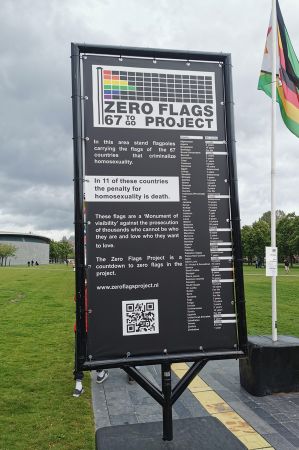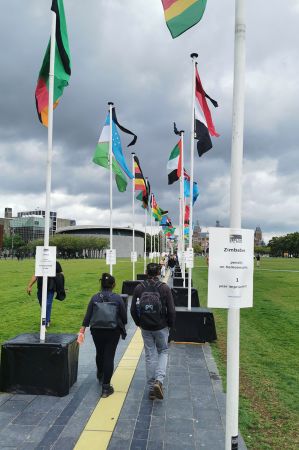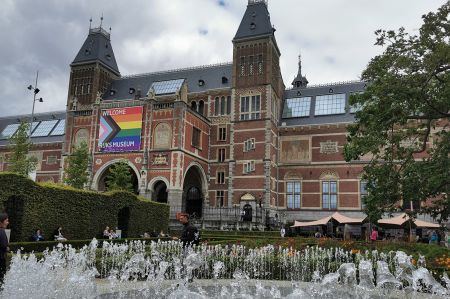When trying to get tickets for the Van Gogh Museum in Amsterdam (at the time there were 4 - 6 weeks to book in advance), we also came across the so-called Museumsplein, where we noticed the many, mostly unknown national flags who accompanied the path across the green space.
Our interest was aroused, as we had already noticed countless rainbow flags on the objects in the area: the "Zero Flags Project - 67 to go". This flag parade should give us a lot to think about, as it showed the states where homosexuality can still be prosecuted, even punishable by the death penalty. It is unbelievable which countries are listed here and how partly our German view (and above all that of the economy) prevails with these states. Human rights are trampled underfoot, but that doesn't seem to play a role in business policy and particularly badly in sports, here only the reference to the World Cup in football.
Is tolerance a Dutch cultural asset?
 With politicians left and right crowding their way to national gay celebrations like Amsterdam Gay Pride and Roze Zaterdag (Pink Saturday) to show their openness to gays, the acceptance of gays in the Netherlands seems more Dutch in culture to be as a goal of an emancipation movement that is still to be striven for. That newcomers to the Netherlands are presented with tolerance towards homosexuality as an important part of 'the' Dutch norms and values reinforces the picture. The Netherlands is also known internationally for its largely equal legal treatment of homosexuals and heterosexuals. No doubt responsible for this homosexual-friendly image is that the Netherlands was the first country in the world to allow civil marriage for same-sex partners.
With politicians left and right crowding their way to national gay celebrations like Amsterdam Gay Pride and Roze Zaterdag (Pink Saturday) to show their openness to gays, the acceptance of gays in the Netherlands seems more Dutch in culture to be as a goal of an emancipation movement that is still to be striven for. That newcomers to the Netherlands are presented with tolerance towards homosexuality as an important part of 'the' Dutch norms and values reinforces the picture. The Netherlands is also known internationally for its largely equal legal treatment of homosexuals and heterosexuals. No doubt responsible for this homosexual-friendly image is that the Netherlands was the first country in the world to allow civil marriage for same-sex partners.
 At first glance, the acceptance of the group of men and women who identify themselves as homosexual or bisexual - around five percent of the Dutch population - seems no longer a cause for concern in the 21st century. Beneath the surface, however, the current tolerance of homosexuality does not appear to be without ifs and buts. Not only has the feeling of insecurity on the street among homosexual men and women increased in recent years. Gay students are also five times more likely to attempt suicide than their straight classmates. Regular studies by the Sociaal Cultureel Planbureau on the acceptance of homosexuality show that the Dutch tolerance of homosexuality for many Dutch people is linked to one condition: homosexuals should not show too clearly that they are homosexual. In short, they are tolerated as long as homosexuals behave "normally."
At first glance, the acceptance of the group of men and women who identify themselves as homosexual or bisexual - around five percent of the Dutch population - seems no longer a cause for concern in the 21st century. Beneath the surface, however, the current tolerance of homosexuality does not appear to be without ifs and buts. Not only has the feeling of insecurity on the street among homosexual men and women increased in recent years. Gay students are also five times more likely to attempt suicide than their straight classmates. Regular studies by the Sociaal Cultureel Planbureau on the acceptance of homosexuality show that the Dutch tolerance of homosexuality for many Dutch people is linked to one condition: homosexuals should not show too clearly that they are homosexual. In short, they are tolerated as long as homosexuals behave "normally."
83% of the Dutch feel comfortable in their own country
How can one understand this situation – a situation in which tolerance towards homosexuality is presented as a Dutch cultural asset on the one hand and, on the other hand, only applies under the stipulation that homosexuals should not deviate too much from the average Dutch person?
In a global survey of gays and lesbians, 83% of Dutch people felt at home in their home country. In Germany, only 62% of respondents said so.
This puts Germany in 19th place out of 123 countries - just a few places ahead of Nicaragua with 54% (24th place) and Mexico with 53% (25th place).
Far more conservative European countries such as Spain (4th place with 79%) and Italy (18th place/ 63%) are ahead of Germany in this survey, as are Uruguay (10th place/ 71%) and Brazil (16th place/ 68%).
This result quickly raises the question of whether Germany rightly just barely made it into the top 20 or whether we German lesbians and gays are answering the question: "Is the city or area where you live a good place or not a good place to live for gay or lesbian people?” are simply more critical than other nations.
Most countries are not LGBT feel-good places
Between 2009 and 2013, the international research institute Gallup surveyed 1,000 homosexuals on their satisfaction in their own country. However, a number of countries are missing from the study, such as Egypt, Saudi Arabia, Iran, Iraq, Nigeria, Bahrain, Kuwait and Uzbekistan. It was always too delicate there to even ask the question described above.
Nevertheless, the survey gives a clear picture of the feel-good factor of LGBT people in their home countries: With the Netherlands, Iceland (82%) and Canada (80%) in the top 3 of the ranking, it shows that the community is mainly in western countries, in which gay marriage is now legally recognized to a large extent, feels particularly comfortable.
In contrast, in about one in four countries on the list the number of "no" answers was higher than the number of "yes" answers. Sadly bringing up the rear are four African countries - Ethiopia, Mali, Uganda and Senegal - and three Asian countries: Afghanistan, Indonesia and Pakistan. Only 1 - 2% of the lesbians and gays living there feel comfortable here.
Please read as well:
The world behind the veil - Saphia Azzedine
Hatice Akgün - stations with questions about integration


